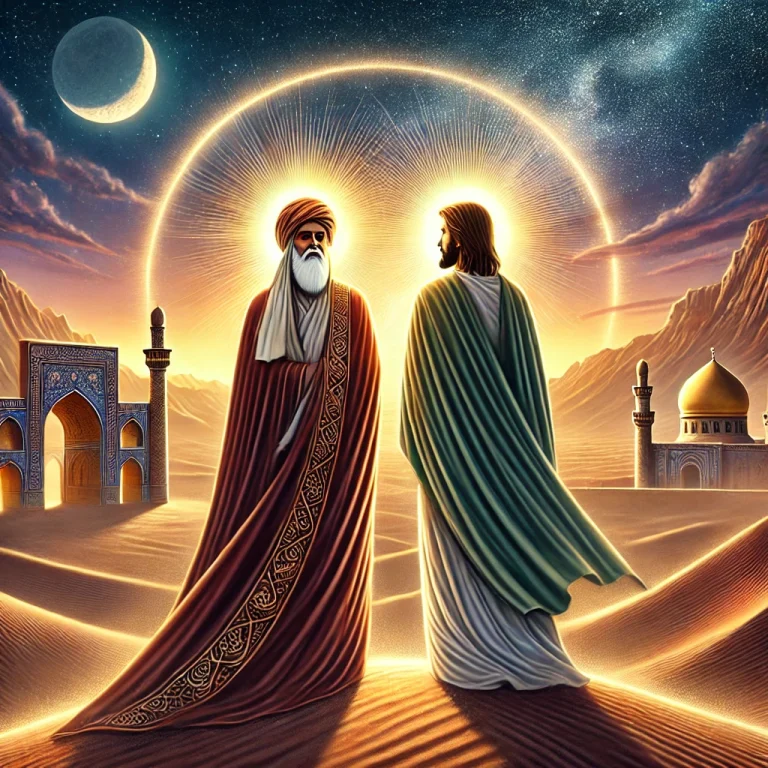One of the most fascinating aspects of Islamic eschatology is the belief in the return of two divinely appointed figures: Imam Mahdi, the twelfth Imam, and Prophet Isa (Jesus, A.S.). While the concept of the Mahdi is deeply rooted in both Sunni and Shiite traditions, Shiite Islam has a unique perspective on how the Mahdi and Jesus will work together to establish justice on earth. Their return isn’t just a prophecy—it’s a promise of divine intervention at a time when the world needs it the most.
Who Is Imam Mahdi?
Imam Mahdi, according to Shiite belief, is the twelfth and final Imam, born in 869 CE as Muhammad ibn al-Hasan al-Askari. Unlike other historical figures, the Mahdi is considered to be in a state of occultation—alive but hidden by divine will. He will return at a time when oppression and injustice have reached their peak, to establish divine justice and lead humanity toward righteousness.
The Role of Jesus in the End Times
While Imam Mahdi is the central figure of divine leadership in Shiite eschatology, Prophet Isa (Jesus, A.S.) plays a crucial role in supporting his mission. According to Islamic belief, Jesus was not crucified but was raised to the heavens and will return at the end of times. His return is prophesied in both Sunni and Shiite traditions, with key references in the Quran and Hadith.
The Quran states in Surah An-Nisa (4:157-158):
“And for their saying, ‘Indeed, we have killed the Messiah, Jesus, the son of Mary, the Messenger of Allah.’ And they did not kill him, nor did they crucify him; but another was made to resemble him to them. And indeed, those who differ over it are in doubt about it. They have no knowledge of it except the following of assumption. And they did not kill him, for certain.”
This verse is interpreted to mean that Jesus was not executed, but rather, he was saved by divine intervention and will return at the appointed time.
The Alliance of the Mahdi and Jesus
Shiite traditions emphasize that when the Mahdi reappears, Prophet Isa (A.S.) will descend from the heavens to support him. The two will work together to establish divine justice, with Jesus playing a vital role in correcting misconceptions about his own teachings and bringing people back to the true monotheistic faith.
A well-known hadith states:
“The Mahdi will appear among my community. Allah will make it rain and the earth will bring forth its fruits. Wealth will be distributed justly. Livestock will increase and the community will grow. He will rule for seven or nine years. Then, Jesus son of Mary will descend… and the leader of the Muslims (the Mahdi) will say to him: ‘Come, lead our prayer.’ But he will reply: ‘No, you are the leader over them.'” (Sunan Ibn Majah, 4077)
This hadith highlights an important aspect of Shiite eschatology: while Jesus is a revered prophet, he will defer leadership to the Mahdi, acknowledging him as the rightful divinely appointed leader. This is significant because it affirms the Mahdi’s central role in establishing the final rule of justice on earth.
The Mission of Jesus Upon His Return
According to Shiite traditions, Jesus will have a few key responsibilities upon his return:
- Confirming the Truth of Islam – Jesus will clarify that he never claimed divinity and will reaffirm the oneness of Allah.
- Uniting Believers Under the Leadership of the Mahdi – He will assist the Mahdi in establishing justice and peace, bringing unity among the followers of different faiths.
- Defeating the False Messiah (Dajjal) – A major part of Jesus’ mission will be to lead the fight against Dajjal, a figure of extreme deception and evil.
- Establishing Global Peace and Justice – With the Mahdi, Jesus will play a key role in spreading divine justice across the world.
The Defeat of Dajjal: A Joint Effort
Dajjal, also known as the Antichrist, is a figure who will spread corruption and falsehood in the world before the Mahdi’s emergence. Islamic traditions hold that Dajjal will deceive many with miracles and false claims of divinity. The Mahdi and Jesus will stand together against him, leading the final battle that will result in Dajjal’s defeat. According to a hadith, Jesus will be the one to personally kill Dajjal:
“The son of Mary will kill the Dajjal at the gate of Ludd (modern-day Lod, Israel).” (Sahih Muslim, 2937)
This moment will mark the end of falsehood and the establishment of divine justice.
Why Is This Belief Important?
The return of Imam Mahdi and Jesus is more than just an eschatological event—it carries profound spiritual and moral lessons for believers today. It teaches:
- Hope in Divine Justice – Even in times of oppression, believers are reminded that injustice will not last forever.
- Unity of Monotheism – The return of Jesus reaffirms that true faith is in the worship of one God.
- The Role of Leadership and Guidance – The Mahdi’s leadership teaches that divine guidance is essential for a just society.
- Preparing for the Future – Believers are encouraged to live righteously and work toward justice in anticipation of the Mahdi’s return.
Conclusion: A Future of Divine Justice
Shiite belief in the return of Imam Mahdi and Jesus (A.S.) is not just about the end times—it’s a vision of hope, justice, and divine mercy. Together, these two figures will eradicate oppression, defeat falsehood, and establish the rule of divine justice on earth. While the timing of their return remains unknown, their mission serves as a guiding light for all those who seek truth and righteousness in a world filled with uncertainty. Until that day comes, believers continue to pray, prepare, and uphold the principles of justice and faith in their daily lives.



